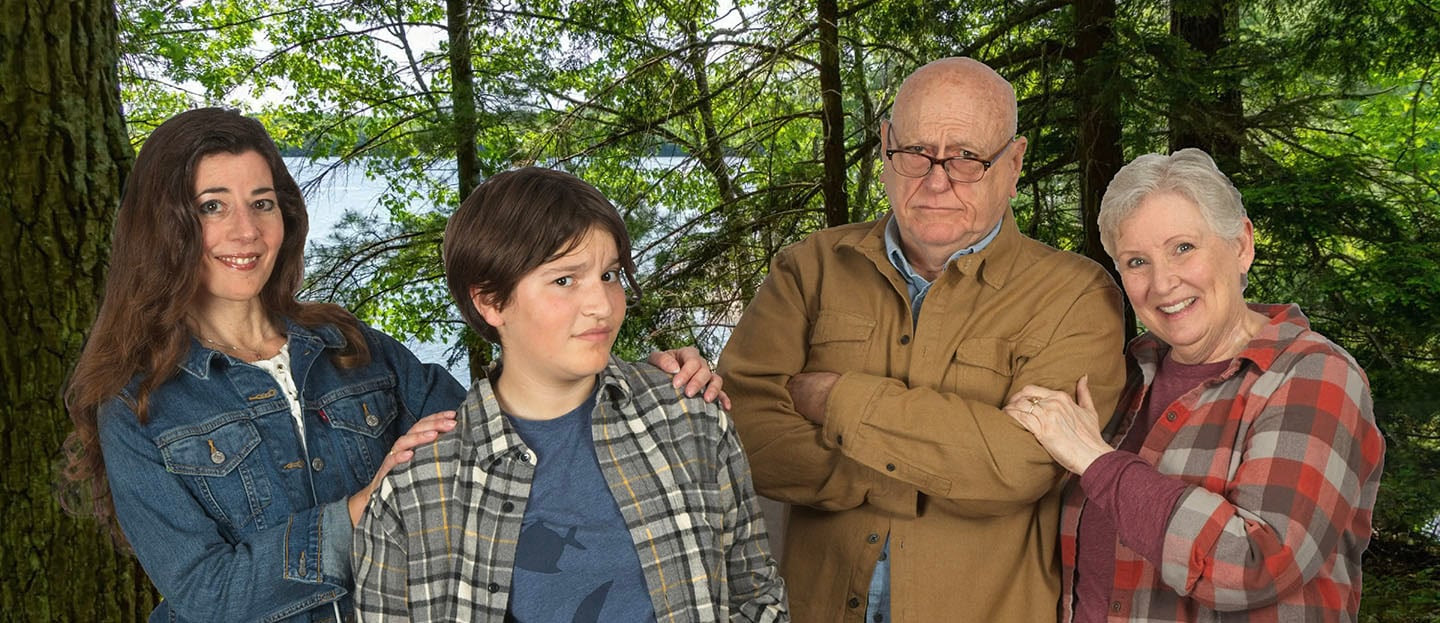Theater: Limelight’s ‘On Golden Pond’ examines the complexities of family
Comedic drama addresses topics of marital relationships, inter-generational division, and unconditional love
![]()

From left: Kristin Lynn as Chelsea Thayer Wayne, Miriam Shem-Tov as Billy Ray, Bill Tindall as Norman Thayer Jr., and RuthE. Stein as Ethel Thayer in Limelight Actors Theater’s production of “On Golden Pond.”
By Calvin Nuttall
 A heartwarming tale of family dynamics and reconciliation, “On Golden Pond” opens at the Morgan Hill Community Playhouse March 29. Limelight Actors Theater’s production of the classic comedic drama explores themes of aging, regret and the complexities of intergenerational bonds.
A heartwarming tale of family dynamics and reconciliation, “On Golden Pond” opens at the Morgan Hill Community Playhouse March 29. Limelight Actors Theater’s production of the classic comedic drama explores themes of aging, regret and the complexities of intergenerational bonds.
When elderly “Norman Thayer’s” estranged daughter suddenly returns to his life, he is initially resistant. However, as he gradually becomes aware of his own mental decline, he is forced to grapple with the reality he may be running out of time to repair his relationships with the people who matter the most to him.
“It’s a play about family and honesty, which includes all of the dysfunction that comes with it,” said director Bryan Freeman. “One of the things that I enjoy about it is that it doesn’t hide the sometimes brutally honest nature of family.”
Bill Tindall stars as “Norman Thayer,” a curmudgeon in the golden years of his life. RuthE Stein plays his wife “Ethel,” the emotional anchor of the family. And Kristin Lynn is “Chelsea,” the couple’s daughter who, like her dad, is strongly independent.
The show takes place during the senior couple’s visit to their summer home on Golden Pond for the 48th year in a row. There they are joined by Chelsea, her boyfriend, “Bill Ray,” played by Doug Brook, and his son, “Billy Ray Jr.,” played by Miriam Shem-Tov.
“Chelsea has been away for eight years, and doesn’t realize how old they have gotten until she comes back and sees them again,” Lynn said. “While she doesn’t plan to keep up the grudge for the duration of their lives, I think she hasn’t quite come to terms with the fact she has limited amount of time to make up with them.”
Chelsea is a “feisty, down-to-earth” woman with a morbid streak that takes after her father, Lynn said. Her similarities to her dad are one source of the friction in their relationship, as both individuals are strongly independent, causing them to clash.
“He is used to being in control of everything,” Tindall said. “He is pretty harsh with his words. He certainly has a soft spot for his wife, he is very much in love with her. His daughter, I think they just never clicked. She tried and tried and tried, and just was never quite enough. I’m not sure he even knows why himself.”
Made famous by actors Katharine Hepburn, Henry Fonda and Jane Fonda in the 1981 film, Limelight actors bring this inter-generational rivalry to life onstage. Originally based in Gilroy as a presentation of South Valley Civic Theater, the theater company recently lost its home at the Gilroy Center for the Arts and is now performing at the Playhouse as it finds a new venue.
While the story remains fundamentally the same as the movie, this group of performers has brought their unique voice to the classic roles, Freeman said.
“It’s fun watching these two play-off of each other,” he said. “It is very much the idea of becoming the parent you may not necessarily get along with the best. There are strongly similar personality traits between the two characters, even through their disagreements.”

As her lifelong partner’s cognitive ability gradually declines, Ethel quickly catches notice, and takes on the burden of his care.
“She understands him better than anybody else in the world,” Stein said. “He can be a handful, but I know him well enough, because I have seen him and how wonderful he is. He doesn’t show that to very many people. She is slowly discovering these changes he is going through, and thinking, ‘What the heck is going on with you this summer?’ And all of these little pieces start coming together.”
The younger couple ask Norman and Ethel to look after Billy Jr. while they go on vacation. Ethel agrees, much to Norman’s chagrin, and the two temporarily take in the young man. Despite Norman’s initial hesitation, Billy’s youthful exuberance quickly wins over the grouchy grandfather.
“It certainly changes him,” Tindall said. “He is the boy he has always wanted, which is really sad for Chelsea. Billy is just as feisty, just as independent as Norman. He never quite admits it, but I think he is a bit excited to have this kid around. Through the process, they become great friends.”
The addition of the young man brightens the elderly couple’s lives and revitalizes Norman. The two begin to spend much of their time fishing. Their relationship creates an avenue for the father to find common ground with which to reconcile with his daughter.

“I like the way Bryan has directed us,” Stein said. “In some versions of the story, it is just too saccharine-sweet. That is not his intent, his intent is to turn it over and look at its underbelly and see what is really going on. He doesn’t let us shy away from that. This is the hardest I’ve ever worked, because he is so good at pulling more out of actors than they ever thought they could do.”
Between the small cast size and the dramatic format, the actors agreed rehearsing has been unlike most shows they have been involved with.
“It’s been more like a workshop than a rehearsal, which I love,” Tindall said. “It’s a completely different process for me than a lot of shows. We have had a lot of time to really look at the dialogue, which I love dissecting, and really trying to find something new and different. We’ve been able to try different things and different emotions and I’ve been very appreciative of the process.”
Freeman refers to himself as merely an “elevated audience member” in his directing style, preferring to allow the actors to find the characters themselves through the rehearsal process. Doing so lends a more natural feel to the performance, which the audience will find more relatable.
 “Bryan really helped us find these characters with the clues in the script,” Lynn said. “Once you are ‘off-book,’ (off the script) it gives you the chance to interpret what is behind the particular lines, the difference between what she is saying and what she means. Now you can bring that meaning into your voice, into your physicality.”
“Bryan really helped us find these characters with the clues in the script,” Lynn said. “Once you are ‘off-book,’ (off the script) it gives you the chance to interpret what is behind the particular lines, the difference between what she is saying and what she means. Now you can bring that meaning into your voice, into your physicality.”
In theater, as in movies and television, much work happens behind the scenes to bring the story to life. “On Golden Pond” is no exception.
“Art at its best is collaborative,” Freeman said. “It’s a collaboration between the director, the actors, the crew who lights them and gives them sound, the people who built the sets, and most importantly, the audience. That is the beauty of theater compared to film — it’s immediate, it’s happening right before you.”
Calvin Nuttall is a Morgan Hill-based freelance reporter and columnist.
